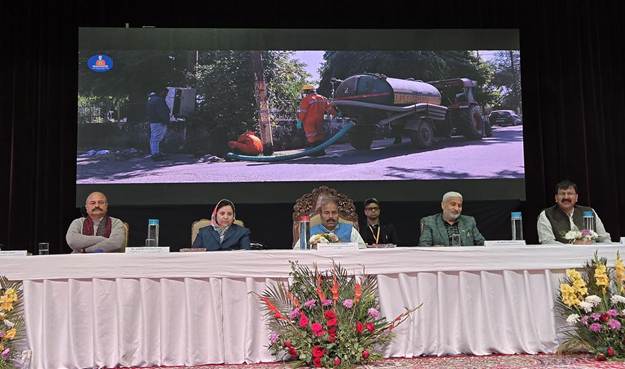NAMASTE Scheme

- 19 Feb 2025
In News:
The National Action for Mechanized Sanitation Ecosystem (NAMASTE) scheme, launched by the Government of India, aims to empower sanitation workers, particularly Sewer and Septic Tank Workers (SSWs), also known as SafaiMitras.
Key Highlights:
- It focuses on ensuring their dignity, safety, and economic empowerment, while promoting the mechanization of sanitation processes.
- The scheme is designed to address the challenges faced by these workers, who are often exposed to hazardous conditions.
Objectives of the NAMASTE Scheme
The primary objectives of the NAMASTE scheme include:
- Formalization of sanitation work and enhancing occupational safety.
- Promotion of mechanized cleaning techniques to reduce manual interventions.
- Providing personal protective equipment (PPE) and other safety devices to workers.
- Ensuring economic and social empowerment of sanitation workers.
Implementing Agencies and Timeline
- The NAMASTE Scheme is implemented by the Ministry of Social Justice and Empowerment (MoSJE) and the Ministry of Housing and Urban Affairs (MoHUA).
- The scheme is executed by the National SafaiKaramcharis Finance and Development Corporation (NSKFDC), under MoSJE.
- The scheme is scheduled for implementation from FY 2023-24 to 2025-26, with a target group comprising sewer workers, septic tank workers, and waste pickers (the latter being added in 2024).
Key Initiatives Under NAMASTE
- Distribution of PPE Kits: Under the scheme, PPE kits are provided to sanitation workers to safeguard them from health hazards, especially while working in unsafe environments like sewer lines and septic tanks. These kits include masks, gloves, goggles, face shields, gowns, and shoe covers.
- Ayushman Health Cards: Ayushman Bharat Pradhan Mantri Jan Arogya Yojana (AB-PMJAY) health cards are distributed to SSWs under the scheme. These cards enable workers to access cashless healthcare at empaneled hospitals, ensuring that sanitation workers receive timely medical attention without financial burden.
- Capacity Building and Training: The scheme promotes capacity building for SSWs through training programs on safety protocols, mechanized cleaning processes, and the use of modern sanitation technologies. This helps improve the efficiency and safety of their work, while also reducing manual handling.
- Promoting Mechanization: To reduce the hazardous practice of manual scavenging, the scheme focuses on providing mechanized equipment to enhance sanitation operations and create safer working conditions for workers.
